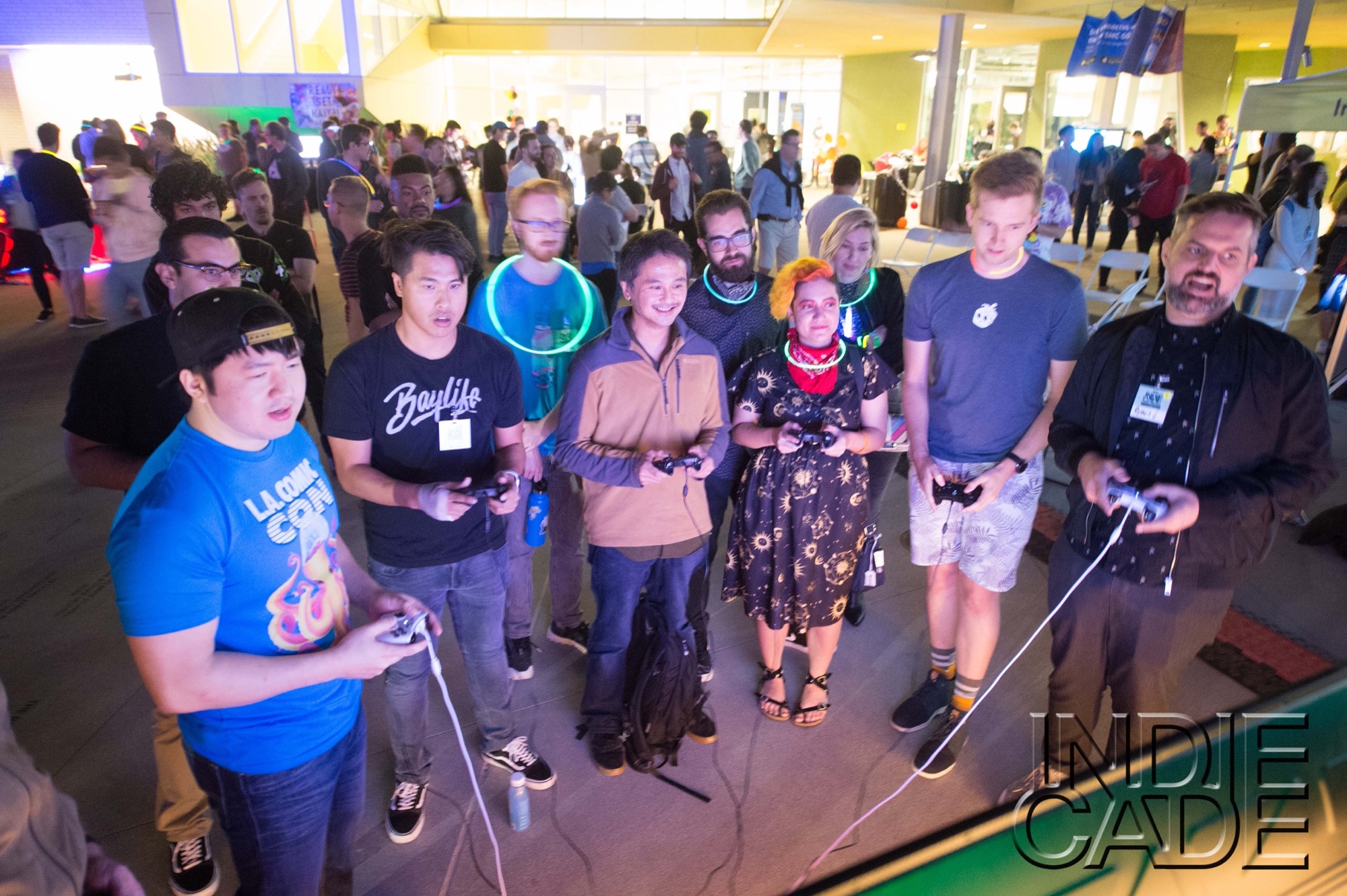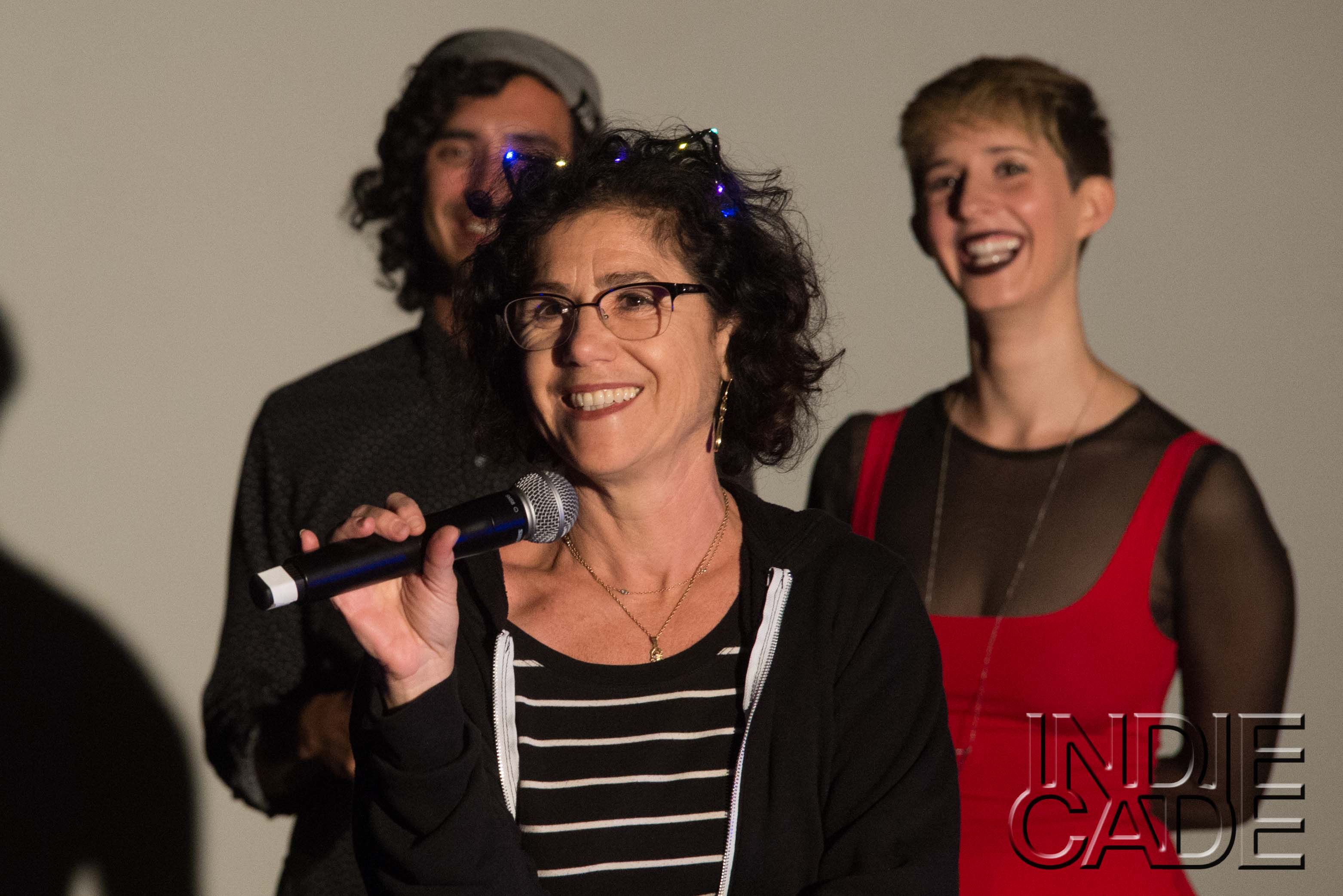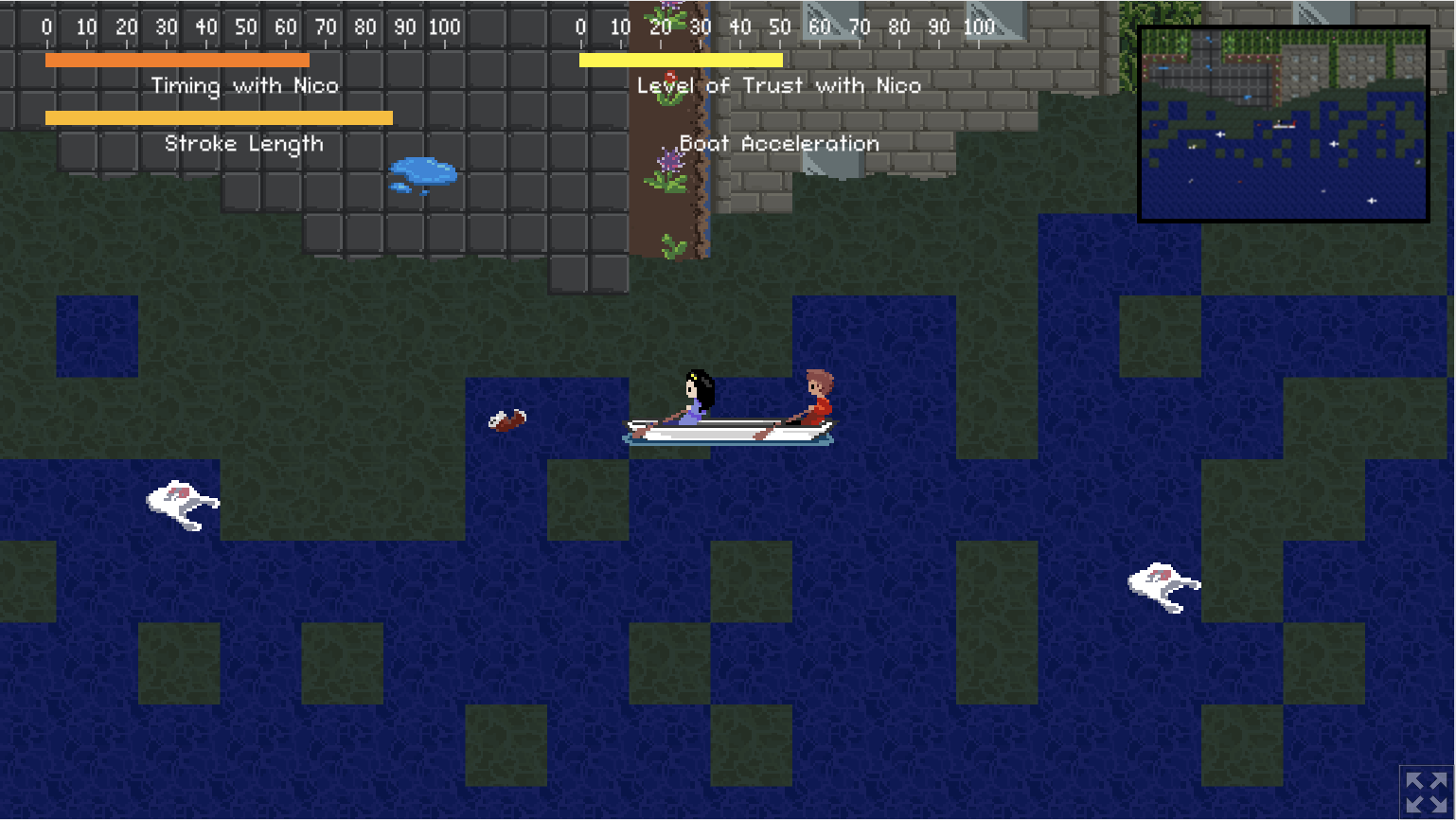Feeling Hopeless About Climate Change? Try Playing These Video Games
11:55 minutes

 Five years ago, Stephanie Barish was tired of the public’s attitude about climate change. “Most people at that time were just so negative about climate,” she said. “It was doom and destruction, and I thought, wow, to make positive change, you have to really look at this from a solutions perspective.”
Five years ago, Stephanie Barish was tired of the public’s attitude about climate change. “Most people at that time were just so negative about climate,” she said. “It was doom and destruction, and I thought, wow, to make positive change, you have to really look at this from a solutions perspective.”

Stephanie is the founder and CEO of Indiecade, an organization that supports indie video game developers and hosts events like the Climate Jam—the goal of which was to change the gloomy public narrative around climate change. So, with the help of organizations like Earth Games, participants around the globe gather every year to make video games about climate change optimism, solutions, and justice.
Teams can also consult with subject matter experts, like Dargan Frierson, an associate professor of atmospheric sciences at the University of Washington, and also a judge for the Climate Jam. If teams wonder what climate change would look like on a different planet, they can go to him for answers. “We always look for scientific accuracy,” he said. “I think it’s very important to keep things within the realm of possibility, even when you’re looking at fiction.”
This year, the game jam was virtual. Teams had 10 days to make their games, and included submissions like Denial Network, where you play as a group of activists fighting against climate change misinformation. In another game called Change Waker, you play as a cute little sentient blob sailing around an archipelago, helping other sentient blobs solve environmental problems impacting their islands.
The winner of this year’s jam was Row, a sobering, but ultimately hopeful game about learning how to trust your enemy. It’s set in a world where climate change has take its toll: drought and intense rainfall have driven two neighboring cities to violence. And your character ends up in a row boat with your enemy as you both try to survive—and hopefully build a brighter future.

“I think if you just stay in that place of just feeling hopeless, it can often translate into apathy, which I see a lot among people my age, because [climate change] is such a daunting thing,” said Jay McGregor, a film production student at USC and one of the narrative designers on Row. “We’re trying to acknowledge that humans play one of the biggest roles in causing the climate crisis. And at the same time, we also hold the key to solving it.”
SciFri producer D Peterschmidt talks to the participants of this year’s Climate Jam about how they think the narrative around our climate’s future needs to change, and even plays some of Row with Ira.
Row Credits:
Narrative Designers: Jay McGregor, Britney Ngaw
Art Director: Andria Liu
Composer: David Hunter
Software Engineers: Johnathon Slightham, Benn McGregor
Check out the song Dargan wrote about science below.
Read a transcript and the lyrics of the song here.
Invest in quality science journalism by making a donation to Science Friday.
Stephanie Barish is the founder and CEO of Indiecade.
Dargan Frierson is an associate professor of atmospheric sciences at the University of Washington.
Jay McGregor is a film production student at USC.
Ira Flatow is the founder and host of Science Friday. His green thumb has revived many an office plant at death’s door.
IRA FLATOW: This is Science Friday. I’m Ira Flatow. We talk a lot about climate change on the program, but we also like to talk about the people who are coming up with solutions to fight it. SciFri producer D Peterschmidt is here to tell us about a community of video game developers– I want to hear this– who are taking this challenge to the virtual world. Hi, D.
D PETERSCHMIDT: Hey, Ira. Yeah, so before we start, have you heard of something called a game jam before?
IRA FLATOW: A game jam? I don’t think so.
D PETERSCHMIDT: OK, have you heard of something called a hackathon?
IRA FLATOW: That I have heard about.
D PETERSCHMIDT: OK, so yeah, you’re working on a team to make something, in this case like a video game, in a very short amount of time, and there’s this one that I found out about called the Climate Jam. It’s put on by this organization called IndieCade. And the goal of this jam is to make games about climate change.
STEPHANIE BARISH: Our goal of having a Climate Jam has always been to have climate solutions and to be positive. We’re not looking for some kind of like death and destruction jam.
D PETERSCHMIDT: So that was Stephanie Barish. She’s the CEO of IndieCade, and she and some other partners started the Climate Jam five years ago.
STEPHANIE BARISH: We’re really interested in challenging our community to create something that could potentially make a positive difference. Most people at that time were just so negative about climate. It was doom and destruction. And I thought, wow, to make positive change, you have to really look at this from a solutions perspective.
IRA FLATOW: All right, she says you have to look at it from a solutions perspective. So you make a game. Have we got a game that won? Yeah, I want to know how that turned out.
D PETERSCHMIDT: Yeah, so the game that one is called Row, and we’re actually going to play together.
IRA FLATOW: Ooh, all right, let’s do that. But before we go, since this is brand new to me, you got to give me a hint of what the game is all about.
D PETERSCHMIDT: OK, all right, so basically Row’s set in a future where the effects of climate change are a lot more exaggerated. Drought is a much bigger problem. There are these two neighboring cities, and when it stops raining, one city builds a dam to hoard all the water. And it leaves the other one in a pretty tough spot.
So there’s drought. People are getting sick because of dehydration, including your character’s grandmother, and the other city’s unwilling to share the water. So your character takes a rowboat to get some fresh water from the other city to get your grandma healthy again. But the rains suddenly start again with a vengeance, and a huge flood ends up submerging and destroying both cities in kind of the middle of your journey.
So through all of this, you have to become rowing partners with someone from the other city who’s basically your enemy, and you have to work together to survive. So yeah, let’s get started.
IRA FLATOW: Should I hit the Play button on there?
D PETERSCHMIDT: Yeah, let’s go ahead and hit Play.
IRA FLATOW: OK. I see. It says, “Welcome to your rowboat.” OK, now I’m rowing. Oh, that was a good stroke. I see how to do this.
D PETERSCHMIDT: Yeah.
IRA FLATOW: It takes shorter strokes.
D PETERSCHMIDT: Yeah, that’s what I’m thinking, too.
IRA FLATOW: Oh, really, woo. I’m going zipping– wait, there’s another item. It’s a fun game. This is a fun game.
D PETERSCHMIDT: All right, so we’re going to put down our oars for a second. We’ll come back to the game later, but I just wanted to tell you about some of the other games that were made for the Climate Jam this year. So there was one called Denial Network, and in that one, you play as a group of activists fighting against climate change misinformation. There’s another called Change Waker, where you play as a cute little sentient blob sailing around an archipelago, helping other cute little sentient blobs solve environmental problems impacting their islands. And sometimes Stephanie says these games actually break outside the boundaries of the Jam.
STEPHANIE BARISH: Last year, a group did a game about garbage collection and recycling, and they ended up going to their city government and creating a game for the city based on the prototype they had created.
D PETERSCHMIDT: And having social impact isn’t the only unique thing about the Climate Jam.
STEPHANIE BARISH: When you join this game jam, you don’t just have access to people who can help you make the game. We have people who are content experts.
DARGAN FRIERSON: I’m Dargan Frierson. I’m a professor of atmospheric sciences at University of Washington.
D PETERSCHMIDT: So Dargan was actually one of these content experts, and he was also a mentor and a judge for the jam.
DARGAN FRIERSON: We always look for scientific accuracy. I think it’s very important to keep things within the realm of possibility even when you’re looking at fiction.
STEPHANIE BARISH: Having science mentors as part of our jams is completely unique. Most jams honestly aren’t about serious topics. When you have a serious topic, you try and bring in experts. In this case, when people are making games, they really need to understand the information. They need to understand how wind turbines work or what the real situation is for sea creatures.
DARGAN FRIERSON: You get a lot of pretty off-the-wall questions. They’re questions like, what would climate change be like on a different planet? We’re just trying to make sure that the games are as accurate as possible. Probably most folks who are listening were like me and thought that most games were sort of violent oriented. But there is this growing movement of folks making games for social change.
JAY MCGREGOR: We’re trying to sort of acknowledge that we humans, as a species, play one of the biggest roles in causing the climate crisis, and at the same time, we also hold the key to solving it.
D PETERSCHMIDT: So I also talked to Jay McGregor. He’s a film production student at USC and part of a team of seven who worked on the game, and he was one of its narrative designers.
JAY MCGREGOR: The game is focusing on the human dimension of the climate crisis like in terms of our relationships with each other and how that will help us deal with it.
DARGAN FRIERSON: I loved that immediately with Row you’re thrust into this very cinematic situation with a lot of drama, and you’re clearly a very impoverished community that, as it turns out, has been dealing with environmental injustice, threats. And that, on top of just gameplay that’s pretty fun rowing, it’s really fun just to move your boat slowly and steadily. It gives you time to ponder the deepness of the narrative.
D PETERSCHMIDT: OK, so there’s this feature in the game, Ira, called the trust meter. So I think that’s on your screen right now. Can you read those instructions?
IRA FLATOW: “The trust meter measures the level of trust between you and Niko. The value affects how easily you’re able to row with him.” Oh, so we have to row together.
D PETERSCHMIDT: Mhmm, all right, so there’s going to be these moments where you have to make a decision through different dialogue options you get or actions you take that’ll affect your trust level with your enemy, Niko. So what’s your level of trust with him right now?
IRA FLATOW: 82%.
D PETERSCHMIDT: Nice, I have been choosing some other dialogue options. I’m at like 45% right now.
JAY MCGREGOR: Ultimately, the idea of that was the way you interact with each other either increases your ability to cooperate or can entrench the level of animosity between you two, and if you guys don’t trust each other as much, your guys are going to go slower because you’re going to be in sync and you have to kind of try hard to work together. And so if you make a choice that increases the trust between you and Niko, you can build human capital, which is an important resource to escape the crisis you guys are in.
D PETERSCHMIDT: So I’ve known about the Climate Jam for a couple of years, and before I fully played through it, I was kind of surprised a game like Row that on its face really leans into these classic climate dystopian themes won the grand prize for a competition that’s focused on climate optimism and solutions. So I asked Jay why his team wanted to focus on dystopia so much.
JAY MCGREGOR: Yeah, it’s kind of doom and gloom with the whole dystopia world, but at the same time, I think if you just stay in that place of just feeling helpless, it can often translate into apathy, which I can see a lot among people who are my age because it’s such a daunting thing. And so we wanted to go through that emotion of feeling hopeless but then having a conflict occur that would make people have to change in some way. We can’t really solve this issue of the climate crisis without some form of collective action, and then in order to have collective action, that requires us to work with each other, including those that we might not necessarily agree with.
And so hopefully– I think that’s the power of video games. They have a very sort of interactive, participatory element to them that can not only change people at an intellectual level in terms of making them aware of these issues but also can touch people at an emotional level. And I think that’s a powerful thing.
STEPHANIE BARISH: Row is kind of dystopian in certain ways, but the fact that they ultimately create a situation where opposing characters can connect and have to work together is an incredible statement. And they bury you deeply into that antagonism that’s going on, so I think it’s really effective. And I think those are the tools that narrative games really give you to work with.
I think it’s so important because, gosh, don’t we live in a world where it’s very hard to cross the aisle and work together? We all do kind of have a common cause, and if there’s ways, even in our differences, that we can work together towards it, that’s how we’ll have a bright and beautiful future.
IRA FLATOW: Well, I think this is an interesting game to play with kids.
D PETERSCHMIDT: Yeah.
IRA FLATOW: Right? So then you can have a discussion about hopefulness and making decisions about your future and who do you trust and how to trust people because, yeah, a lot of things we see are dystopian and a lot of things that are happening now make you think that the future is going to be dystopic. [LAUGHS]
D PETERSCHMIDT: Yeah.
IRA FLATOW: Maybe this is a kind of game that you can have as a teaching opportunity to play with kids. And maybe they can talk out their fears by playing this game. What did you feel about being on the raft or surviving or making a choice who to save?
D PETERSCHMIDT: Yeah, and I know not everyone plays video games. Not everyone’s going to get a chance to play these. But there is something Dargan said about why he thinks this matters, and I thought it was a great point.
DARGAN FRIERSON: As a climate scientist, I spend a lot of time just looking at data, computer model simulations, and you see a lot of red dots meaning drought or really strong rainfall events. But I think to see that through artistic eyes, you realize how much story there is behind any of those data points. Behind any kind of extended drought, there’s always going to be winners and losers and those fighting over scarce resources, and then the approaching flood in this game also is just really dramatic, makes you think that all data should be analyzed with an artistic eye in that way.
D PETERSCHMIDT: And that kind of reminded me of what you just said about kids talking about their fears, playing through them. It’s like basically the appeal of a horror movie, to me at least. You’re able to experience these kind of intense emotions in a controlled, safe environment and have a little removed from it and maybe process them in a way you wouldn’t be able to if you’re too close to it.
IRA FLATOW: Yeah, well, thank you. I enjoyed it. I loved it. I’m going to play it again. Can I play it again?
D PETERSCHMIDT: Yeah, yeah, absolutely.
IRA FLATOW: OK, I’m going to try the other options to see what happens.
D PETERSCHMIDT: OK, great.
[MUSIC PLAYING]
Well, other people can play Row and the other games from this year’s climate jam, and you can even listen to a song that Dargan wrote and sung about his love of science, which is amazing. That’s all at our website at sciencefriday.com/games. Yeah. Thanks again, Ira.
Copyright © 2022 Science Friday Initiative. All rights reserved. Science Friday transcripts are produced on a tight deadline by 3Play Media. Fidelity to the original aired/published audio or video file might vary, and text might be updated or amended in the future. For the authoritative record of Science Friday’s programming, please visit the original aired/published recording. For terms of use and more information, visit our policies pages at http://www.sciencefriday.com/about/policies/
Dee Peterschmidt is a producer, host of the podcast Universe of Art, and composes music for Science Friday’s podcasts. Their D&D character is a clumsy bard named Chip Chap Chopman.
Ira Flatow is the founder and host of Science Friday. His green thumb has revived many an office plant at death’s door.